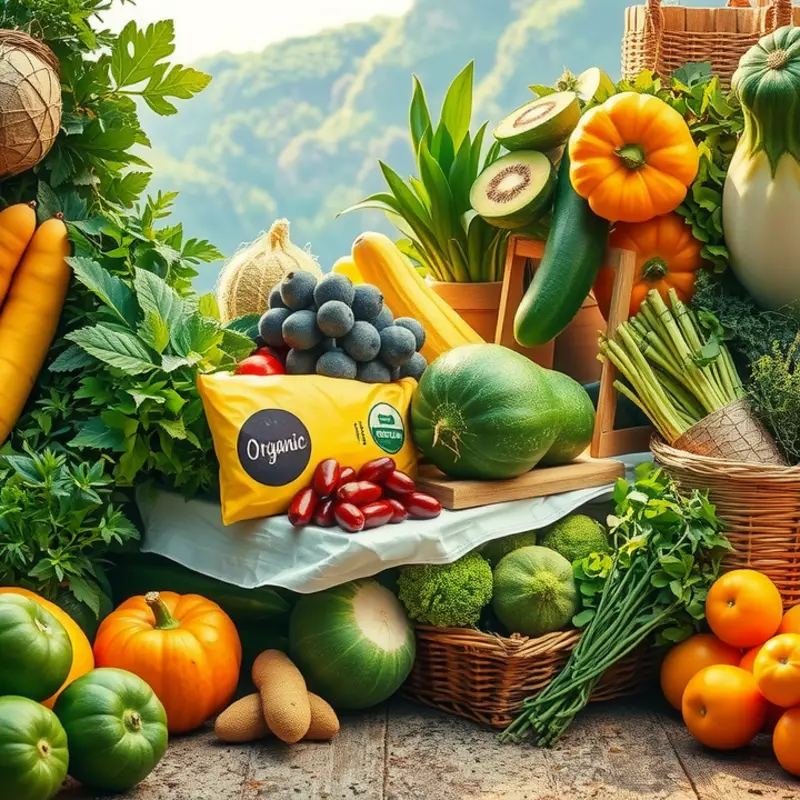Making eco-friendly food choices is essential for a healthier planet and personal well-being. As consumers become increasingly aware of the environmental impact of their purchases, many grocery brands are stepping up to provide sustainable options. From organic produce to responsibly sourced snacks, eco-friendly grocery brands offer delicious choices that support environmentally-conscious living.
Leading Brands Setting Sustainable Standards

As the planet faces pressing environmental challenges, certain eco-friendly grocery brands lead the way in sustainable practices. These companies redefine norms by focusing on organic farming, ethical sourcing, and waste reduction, offering consumers a gateway to conscientious eating.
One crucial sector is fresh produce, where some brands masterfully utilize organic farming techniques. By eliminating synthetic fertilizers and pesticides, they ensure their products are healthier for consumers and the planet. Soil quality improvement and biodiversity preservation are prime goals, making these brands a preferred choice for eco-conscious shoppers.
In the world of snacks, sustainability takes form through innovative packaging solutions and responsible ingredient sourcing. Brands are exploring biodegradable and compostable packaging materials to reduce landfill impact. Furthermore, they commit to fair trade and direct trade sourcing, ensuring that suppliers receive fair compensation while reducing environmental footprint. These initiatives resonate with consumers looking for tasty snacks that align with ethical values.
Moving into household items, the focus extends beyond food to everyday products. Many brands are now emphasizing recyclable and reusable materials in packaging, significantly cutting down on single-use plastics. Ethical sourcing applies here too, as supplies are sourced to support local economies and reduce carbon miles. Household products that are non-toxic and biodegradable further emphasize these brands’ dedication to sustainability.
Another notable aspect is the reduction of food waste. Some brands have implemented creative methods to combat this issue, such as upcycling food by-products into new products, which not only reduces waste but also creates new value. This innovative approach speaks to a broader trend of prioritizing sustainability in every aspect of production.
It’s clear that the commitment of these brands extends beyond marketing. Their comprehensive strategies cover the entire value chain, ensuring minimal environmental impact while maintaining product quality. These ventures are not only setting a precedent but also challenging others in the market to adopt greener practices.
For those exploring sustainable dietary options, you might find inspiration in dishes that incorporate eco-friendly choices. A delicious example is highlighted in this Mediterranean Chickpea Salad, showcasing how simple ingredients can become a burst of freshness while staying true to ethical principles.
Ultimately, the brands spearheading this movement are not just serving consumers; they are fostering a community of change-makers who are passionate about protecting the environment. Their collective efforts mark a transformative shift in the grocery landscape, benefiting both people and the planet.
How to Make Eco-Friendly Choices at the Store

Shopping for groceries with a conscious mind can transform your shopping experience. To align your purchases with eco-friendly values, understanding product labels is crucial. Look for labels denoting sustainability certifications. Certifications like organic, fair trade, and non-GMO help ensure products meet certain environmental standards.
Reading labels is just the start. Recognizing seasonal products helps reduce carbon footprints. Seasonal fruits and vegetables typically require less energy for production and transportation. For similar benefits, consider supporting local farmers’ markets or community-supported agriculture (CSA) programs.
Reducing waste starts with meal planning. By planning your meals in advance, you can purchase exact quantities, thereby minimizing food waste. Start by reviewing your pantry and identifying what you need. Design a shopping list based on planned meals, which helps avoid impulse buys that often lead to waste.
Consider buying in bulk to minimize packaging waste. Many stores offer bins for bulk items such as grains, nuts, and spices. Bringing reusable containers or bags further amplifies your efforts to reduce single-use packaging. Buying in bulk is not only eco-friendly; it often results in cost savings.
When choosing between products, opt for those with minimal and recyclable packaging. Brands are increasingly adopting packaging that is biodegradable or made from recycled materials. Be sure to check recycling codes and local recycling guidelines to ensure proper disposal.
Incorporating plant-based products into your diet can significantly lessen your environmental impact. Livestock farming is resource-intensive and contributes to greenhouse gas emissions. Consider exploring diverse vegetarian options that still provide essential nutrients. You might find inspiration among Mediterranean and keto dishes that highlight plant-based options, like the flavorful Mediterranean Chickpea Salad.
Supporting brands that practice sustainable sourcing is another tangible step. Whether it’s coffee, tea, or chocolate, understanding the origins of these ingredients ensures fair labor practices and environmentally conscious harvesting.
Finally, bring your own reusable shopping bags and produce bags to the store. Many retailers offer incentives for reducing plastic bag usage, and this small habit fosters a larger ecological impact over time.
Implement these strategies to make a real difference at the grocery store. By consciously selecting products, you contribute to a healthier planet while encouraging brands to maintain and advance eco-friendly practices.
Final words
Choosing eco-friendly grocery brands not only supports a healthier planet but also promotes a sustainable lifestyle. By embracing these brands, you contribute to practices that safeguard the environment and future generations. From shopping thoughtfully to encouraging more brands to adopt sustainable methods, every little choice counts. Together, we can foster a marketplace where eco-conscious options thrive and become the norm, paving the way for a greener future and a cleaner earth.








